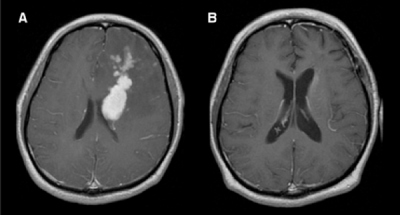Described this week in the Journal of Clinical Oncology, the trial involved 44 patients who were given a combination of high-dose chemotherapy with immune therapy, rather than the standard combination of chemotherapy with a technique known as whole-brain radiotherapy.

The figure shows the before (A) and after (B) brain scan of a primary CNS
lymphoma patient treated with a combination of high-dose chemotherapy with
immune therapy, avoiding the need for whole-brain radiotherapy. Image courtesy of
James Rubenstein.
The new treatment approach was significantly less toxic because it avoided whole-brain radiotherapy, which at high doses can kill brain cells and lead to a progressive deterioration of the function of the nervous system in patients. Many patients die from the toxicity of the radiation as opposed to the cancer itself.
The new treatment also seemed to work better, with the majority of patients on the trial still alive with a follow-up of nearly five years, researchers found.
The article, “Intensive Chemotherapy and Immunotherapy in Patients With Newly Diagnosed Primary CNS Lymphoma: CALGB 50202 (Alliance 50202)” is authored by James L. Rubenstein, Eric D. Hsi, Jeffrey L. Johnson, Sin-Ho Jung, Megan O. Nakashima, Barbara Grant, Bruce D. Cheson, and Lawrence D. Kaplan. It appears in the April 8 issue of the Journal of Clinical Oncology.